
Every website owner is familiar with the instant excitement of seeing a pop-up notice:
Someone submitted a new contact form.
Although many contact forms end up spam, there are occasional offers to post guest articles on your blog. And?
There are many reasons to accept guest articles on your blog. This is an easy way to increase blog output, enrich content, and listen to niche pundits, all of which are good for readers and the site’s SEO.
Having said that, not every guest post advice you receive is a masterpiece. And you may not want to read and reject low-quality articles now.
But if you are curious about whether accepting guest articles is suitable for your blog, you have come to the right place.
We will introduce you to the basics of accepting guest articles, including the pros and cons, the issues you should consider, and how to develop guest article release guidelines to make the selection process as smooth as possible.
- What is a guest article?
- Accept the pros and cons of guest articles
- Notes before accepting guest articles
- How to develop guidelines for the release of guest articles
- Evaluation of guest article recommendations
- Summary
What is a guest article?
A guest article refers to an article published on your blog by someone other than you, or we prefer to call it a contribution article in our country. Usually, these articles are written by people in the niche field of your blog who are interested in sharing their ideas and opinions with a wider audience.
In essence, they are digital versions of guest speeches-just less formal and more lasting, because this article may remain on your blog for years.
So, what are the benefits for invited posters and website business owners?
Invited posters may receive a backlink to their site, which helps with their SEO efforts and may increase natural search traffic.
Website owners can get an article from a subject matter expert and, in some cases, pay for a contribution, making it an attractive way to increase blog revenue.
Accept the pros and cons of guest articles
While accepting high-quality guest articles is a good way to add fresh and authoritative content to your site, it can also be a frustrating and time-consuming process.
Let’s carefully analyze the pros and cons of accepting contributed articles on the blog to see if the advantages outweigh the disadvantages.
Accept the benefits of guest articles
Improve the search engine optimization of the website
Guest articles that bring unique and authoritative views help build the authority of the site-an important factor in ranking on search engines such as Google.
For example, a health and health care website can benefit from guest articles written by doctors. Readers are likely to believe what medical experts say. If you often accept their blog posts, your readers may think your blog is more reliable and spend more time on your blog.
In addition, if you accept requests for guest posts from other blogs that are famous in your field, you can get mutual backlinks from their sites, which will also improve your blog’s search engine optimization.
Add new content to your blog
Accepting guest articles on your website can open a door to your website and bring some new ideas and changes to your website. Different authors will bring different perspectives, writing styles and experiences, which can enrich your blog content and arouse the interest of the audience in new ways.
For example, suppose you run a health and fitness blog and receive a contribution from a personal trainer who wants you to write an article about muscle exercise. Their unique views on fitness will add value to your website and resonate with the audience. Who doesn’t want free advice from a personal trainer?
In addition, if personal trainers promote this article on social media and among their clients, this is another possible source of traffic for your blog.
Increase release frequency
According to HubSpot, small bloggers who focus on increasing organic traffic should post new content up to four times a week. That’s a lot. In particular, taking into account everything else involved in developing an effective digital content strategy.
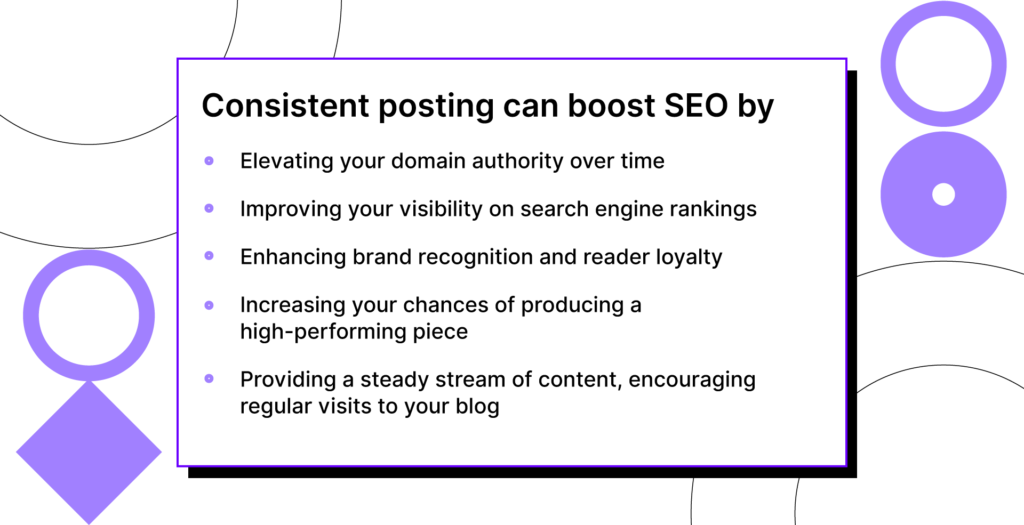
But with guest releases, you have the opportunity to increase your revenue while posting content more frequently. Think of continuous posting as walking onto the batting table. The more times you swing, the more likely you are to hit the ball.
The same goes for content marketing. Publishing more articles (as long as quality is maintained) will only help, while accepting beautifully written and authoritative guest articles will only increase your contribution volume.
The disadvantages of accepting guest articles
Increase the risk of publishing low-quality content
Due to the increased risk of accepting low-quality guest articles, you must be vigilant to prevent these articles from being posted on your website.
If one of the articles is missed, it may have a negative impact on your site’s SEO ranking and reputation.
In addition, poorly written or plagiarized content may lead to search engine punishment. Therefore, it is important to implement validation and strict blog guidelines.
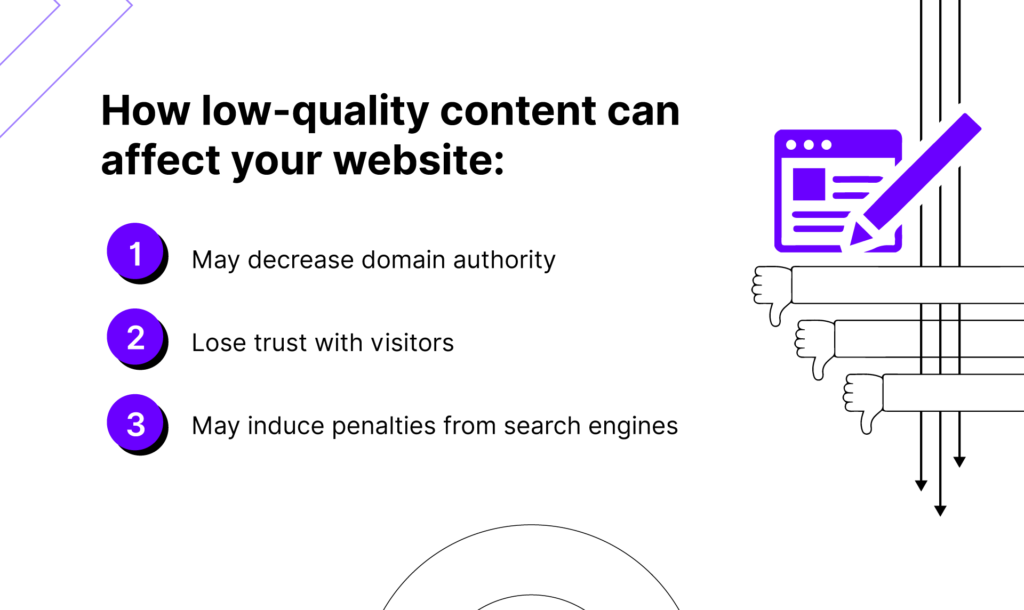
Setting up a system to censor invited posters and freelancers can help you avoid low-quality self-promotion content and maintain your site’s reputation and search rankings.
For example, you run a digital marketing blog and a writer who specializes in food and nutrition recommends a guest article to you. Their writing style may be good, but you should always reserve the right to make a final check to make sure their blog posts meet your quality standards.
It takes a lot of time.
From reading contributions to negotiating terms to editing articles, if you don’t have a system to make sure things go smoothly, the process of publishing guest articles can become very time-consuming. If it is not well managed, it may cost you time and the loss outweighs the gain.
After all, spending time on a blog is probably something you’d rather do than accept a guest post proposal.
However, with the right system and strategy, such as clear guest blog guidelines, you can minimize the amount of time you spend on auditing.
Cause junk or unrelated backlinks
When you start to accept invited blog posts, you will face the risk of low-quality content, including spam or irrelevant backlinks from spam sites.
Suppose your lifestyle blog accepts an article on stress management. Everything seems to be going well until you find a hidden link to a site full of ads and pop-ups, which looks like a hoax. It’s not good.
If visitors click on this link, they will be confused and may be dissatisfied with their experience on your blog. You may lose a reader.
Moreover, if the site has been marked by Google as a fraudulent site in the past, this may affect the domain name weight of your site, thereby reducing your site’s search ranking.
To avoid this, use the inspector to check all guest articles to identify hidden links.
You can use a simple and effective tool on the WordPress website, which is the External Links plug-in. This plug-in allows you to easily check all links on your site and accurately verify their directions.
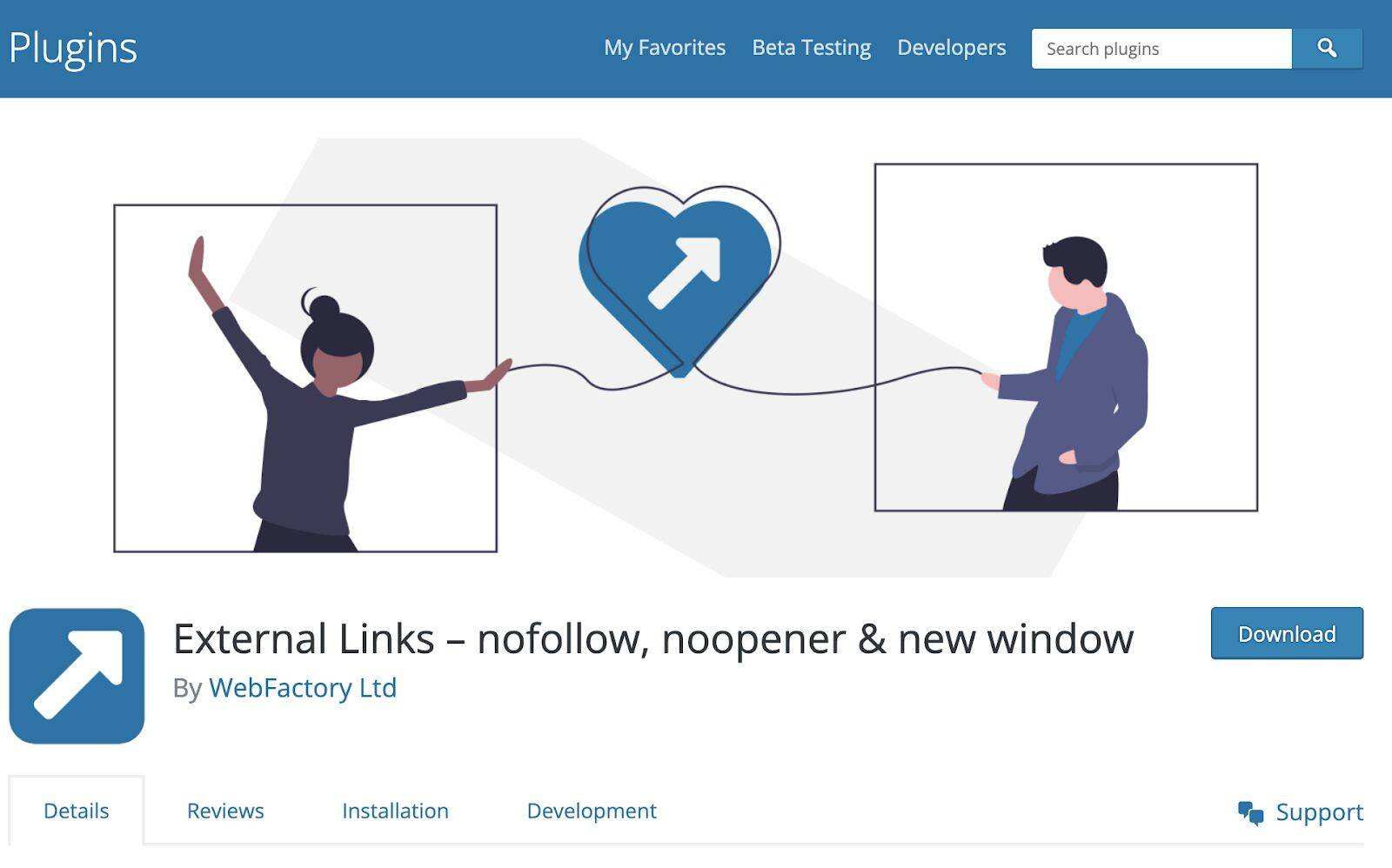
Factors to be considered before accepting guest articles
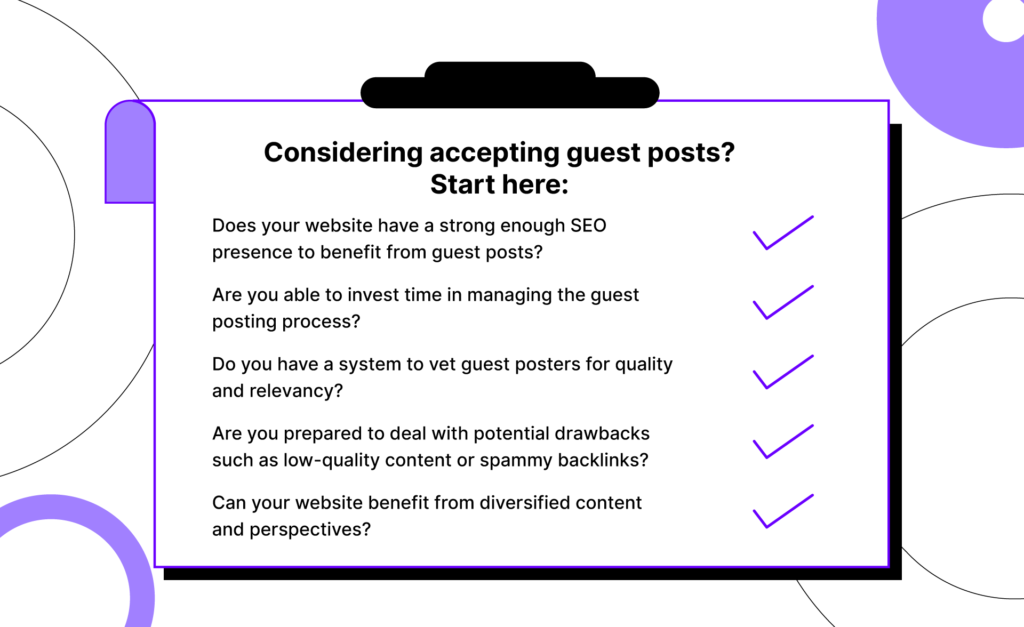
The choice whether or not to accept guest article submissions depends on one factor: value.
Do you and your visitors get more value from guest articles than your time and energy costs? If the answer is yes, then guest posts may be a good supplement to your blog.
Before deciding whether accepting guest posts is suitable for your blog, let’s take a look at some of the factors you need to consider.
Should I charge for guest articles?
Charging for guest articles can bring new sources of income to your blog, but it’s not an easy decision to make.
On the positive side, charging for guest articles ensures that you are paid for the time you spend processing submissions, reviewing content, and optimizing search engines.
However, charging for guest articles may limit the influence of guest articles. While this has a positive effect on filtering unnecessary and unnecessary content, it can also hurt you.
Finding that talented writers can’t afford to pay you is a common problem, which can lead to a reduction in the output of your blog.
How much will you charge?
You may need to experiment with it over and over again before deciding on a pricing plan that suits your blog.
For example, you may find that you can order four guest articles at a price of $500 per month. Or 12 guest articles a month for $250 each. It all depends on your niche, the size of your blog, and the number of authors who want to contribute to it.
Remember that the charge should be fair and reasonable. Charging too little may make your blog seem less credible, while charging too much can deter potential writers. First, take a look at your niche blog and see how much they charge.
How to publicize that you are receiving guest articles?
Once you decide to take the guest post advice, the easiest way is to advertise directly on social media, newsletters and your blog to get more guest articles.
In addition, if you like to participate in live events in the niche field, then networking can also provide mutually beneficial guest articles.
Another way to get more advice is to use your digital content strategy. Many potential invited bloggers use words such as “write for us” or “submit articles” to search for opportunities.

How to implement quality standards?
When you start charging for guest articles, it may be easy to lower your standards and accept articles that you wouldn’t accept if it wasn’t for the money.
But this strategy will soon backfire. Your readers trust the authenticity of your work and the articles you publish. In the long run, sacrificing this is not worth making money in the short term.
It is also important to be transparent about sponsored content and paid articles. This will not only be appreciated by readers, but also a requirement of many platforms.
How to develop a Guest release Guide
Creating a well-defined contributor guide is one of the most effective ways to eliminate all the drawbacks of guest articles and ensure that you get the most out of it.
The following is a step-by-step introduction to how to develop guidelines for accepting guest articles.
1. Determine the goal
Setting your goals will help you achieve two things: one is to form your guest post guidelines, and the other is to set expectations for the goals you want to achieve.
For example, if your goal is to improve search engine optimization, you need to focus on guest articles that contain valuable and insightful content with appropriate keywords.
Or, if you want to reach a new audience, you may want to accept posts from broader niche markets.
two。 Determine the type of content accepted
Next, you need to decide what type of articles your site accepts.
It all depends on your niche, audience and goals. For example, tech blogs may accept guest articles in the form of comments, instructions, or industry news updates.
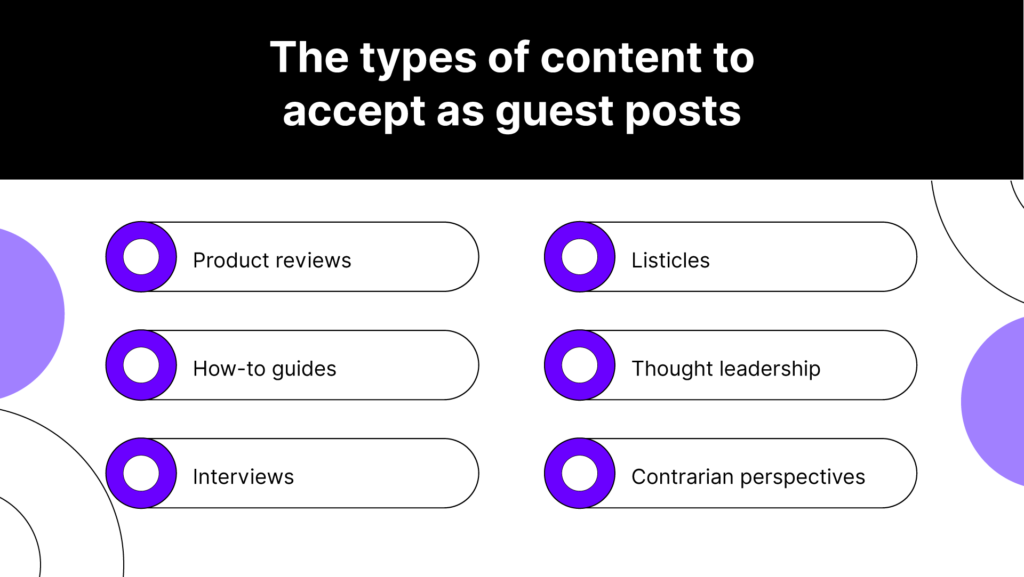
On the other hand, lifestyle blogs may prefer articles such as lists, personal essays or recipes.
In the final analysis, what kind of articles do your typical readers like best?
3. Set quality standard
You can reuse these standards here according to your own article quality standards.
For example, you can require guest articles on your website not to appear anywhere else. Alternatively, you can specify a minimum number of words, a minimum number of sources, or a certain level of personal expertise.
You can also stick to the correct grammar, spelling, and format, and even specify a style guide, such as APA, MLA, or Chicago.
It is also useful to provide examples of high-quality articles on your website, as it allows potential guest publishers to know what they need to write to be accepted.
Be sure to outline your rules on link building, including internal and external links. For example, you might require an internal link for every 500 words and limit external links to the author’s site or highly weighted sources.
If you require the use of pictures or other media in the article, you should also indicate it in the guide.
4. Define the revision and approval process
Another thing to add to the content guide is the revision and approval process.
This is especially important if you accept payment for guest articles. It should be clear when the author will be paid for the work.
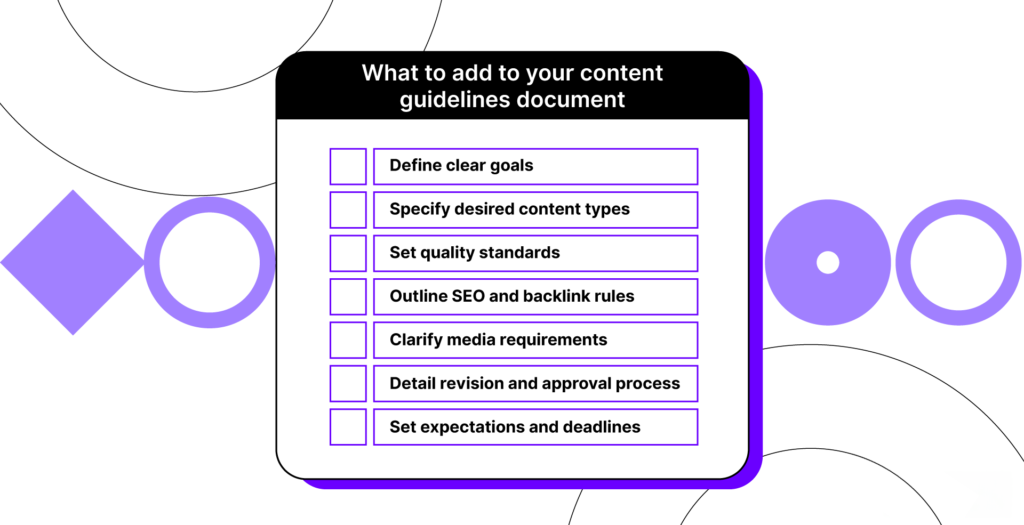
When determining the revision and approval process, you should state that “if the article does not meet the requirements of the guidelines, we reserve the right not to publish it.”
In addition, you should provide invited bloggers with an estimate of the time required for modification and approval, and how they know whether their articles are accepted or not.
5. Management expectation
You need to manage expectations, state how long it will take to approve, and what the author can expect to promote the blog post.
For example, corporate blog owners can let guest publishers know in advance that all blog posts will be shared on their LinkedIn and Twitter accounts.
Evaluation of guest article recommendations
Although the ultimate judge is yourself, you can follow some general guidelines to make the review process easier.
Here are some best practices to follow when reviewing guest articles:
- Know the author’s intentions: whether it’s promoting your own website or affiliate links, the author’s intentions will help you identify their authenticity and integrity.
- Verify the qualifications of the authors: know their background, expertise and credibility. Do they really have extensive experience in the proposed theme, as they claim?
- Review past works and samples: by reviewing the past work of invited authors, you can get a good idea of whether their tone and style match your website.
- Evaluate the quality of the proposal: review the structure, grammar and tone of the proposal and assess the potential quality of the post.
- Confirm topic relevance: before accepting a guest article, you need to make sure that the topic is relevant to your blog’s niche market and the pain points of your audience.
Summary
Deciding how to accept guest articles on the website seems to be a daunting task. However, through carefully planned and clear guest article publishing guidelines, you can increase the content output of your blog and possibly improve search engine optimization.
Finally, you will provide high-quality blogs to readers, who already regard your site as a trusted source of information and authority. Therefore, you must provide the best user experience to attract readers.

